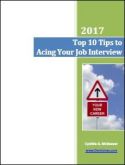 |
||
Common Job Interview QuestionsCommon job interview questions sometimes contain mine fields. You know what I'm talking about...the questions designed to get you talking about things you would rather keep to yourself. Answering interview questions you're a little uncomfortable with goes with the territory here. With good preparation, you'll master these common job interview questions and answers before you know it! Here's our next installment: WHAT ARE YOUR WEAKNESSES?The weakness question may also be asked like this:
I think we all know how to spin the weakness question...pick a weakness that can also be a strength. For example... I'm a perfectionist. I always need to make sure that I don't get carried away when working on a marketing proposal. Or, I love to work. Sometimes I need to remind myself that I have a life outside the office. The interviewer knows that if you've had any interview training, you're going to spin this question and not give a genuine response. That's why a good interviewer will ask the question in a different way. It's hard to give one of these pat answers when I ask you about your last performance review. If you try to say that no developmental areas were discussed, it would be disingenuous at best. In other words, the interviewer won't believe you! So, instead of giving a non-answer, try this approach when answering this common job interview question: speak in terms of developmental opportunities rather than "weakness." For example... I've been successful in turning around a couple of difficult performance issues with my current team, so I've never had to fire someone. I'm going to pick up a new group in this next fiscal year and we're pretty sure that I'll need to let some of them go before the year is out. While I'm not looking forward to this, it goes with the management territory. On the criticism front, again, draw from a strength when confronted by this common job interview question, but attach it to a real situation. For example... In managing a key project team, I had a team member who was missing deadlines. I dealt with the problem directly by talking to the individual about what my expectations were, what the team's expectations were, what the team's expectations were, and the critical part he was playing in the team meeting its objectives. HOW ARE YOU PREPARING YOURSELF TO ACHIEVE YOUR GOALS?It's great to have goals, but if you don't have a plan that's going to allow you to achieve them, you're going to lack credibility, or worse, come off sounding like a pie in the sky dreamer. For each of your goals, think about how you're going to get there. Maybe it's switching companies -- playing in a bigger arena -- picking up global experience. It might be going back to school for an MBA or specialized training in a particular discipline. It might be proactively seeking out new assignments within your organization that expose you to a new area of the business. Again, there's no right or wrong answer here. The interviewer is looking for evidence that you've thought about how you are going to achieve the goals you've set for yourself. TELL ME ABOUT YOUR IDEAL JOB.Your answer to this common job interview question needs to be consistent with the opportunity at hand. I'm not suggesting that you parrot back the job description. Instead, if you're applying for an individual contributor role, your ideal job should not be all about managing people. Likewise, if you are passionate about working in a particular industry, and this job isn't in that industry, you're going to knock yourself out of the running. The interviewer will be listening for elements of your response that track well with the position you're interviewing for, and on the flip side, elements that are inconsistent with this opportunity. If the gaps are too big, you're not going to be invited back. Try to keep your answer fairly generic here. Talk about the industry, the type of company, the corporate culture you're looking for. Talk about challenge and opportunity to take on additional responsibilities in the future. In other words, answer this question conceptually. You'll then want to connect the dots for the interviewer in terms of how you see this position fitting into your ideal job scenario. Additional common job interview questions can be found in these sections: |
|
|
|
[?] SUBSCRIBE
|
||
About Us | Contact Us |
Privacy Policy |
||





